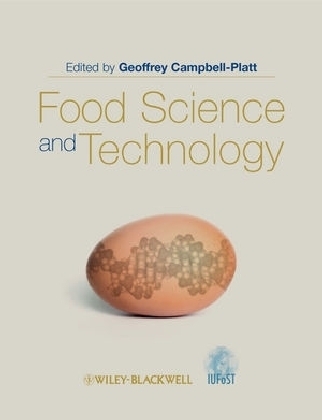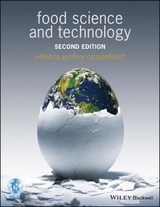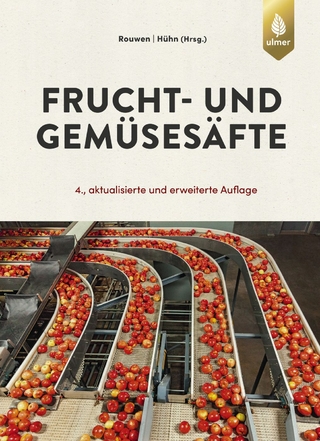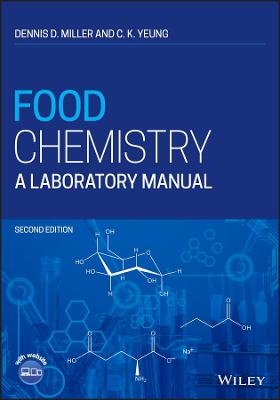
Food Science and Technology
Wiley-Blackwell (an imprint of John Wiley & Sons Ltd) (Verlag)
978-0-632-06421-2 (ISBN)
- Titel erscheint in neuer Auflage
- Artikel merken
This brand new comprehensive text and reference book is designed to cover all the essential elements of food science and technology, including all core aspects of major food science and technology degree programs being taught worldwide. Food Science and Technology , supported by the International Union of Food Science and Technology comprises 21 chapters, carefully written in a user-friendly style by 30 eminent industry experts, teachers and researchers from across the world. All authors are recognised experts in their respective fields, and together represent some of the world's leading universities and international food science and technology organisations.
Expertly drawn together, produced and edited, Food Science and Technology provides the following: Coverage of all the elements of food science and technology degree programs internationally Essential information for all professionals in the food industry worldwide Chapters written by authoritative, internationally respected contributing authors A must-have reference book for libraries in every university, food science and technology research institute, and food company globally Additional resources published on the book's web site: www.wiley.com/go/campbellplatt About IUFoST The International Union of Food Science and Technology (IUFoST) is a country-membership organisation representing some 65 member countries, and around 200,000 food scientists and technologists worldwide. IUFoST is the global voice of food science and technology, dedicated to promoting the sharing of knowledge and good practice in food science and technology internationally. IUFoST organises World Congresses of Food Science and Technology, and has established the International Academy of Food Science and Technology (IAFoST) to which eminent food scientists can be elected by peer review.
For further information about IUFoST and its activities, visit: www.iufost.org
Professor Geoffrey Campbell-Platt is Professor Emeritus of Food Technology at The University of Reading, UK, and President of the International Union of Food Science and Technology. For more information about Wiley-Blackwell's growing list of quality publications in food science, food technology and related areas, visit: www.wiley.com/go/food
List of contributors. 1 Introduction ( Geoffrey Campbell-Platt). 1.1 Food science and technology course elements. 1.2 Evolution of the book. 1.3 Food safety assurance. 1.4 The International Union of Food Science and Technology (IUFoST). 1.5 The book. 2 Food chemistry ( Richard A. Frazier). 2.1 Introduction. 2.2 Carbohydrates. 2.3 Proteins. 2.4 Lipids. 2.5 Minor components of foods. 2.6 Water in foods. 2.7 Physical chemistry of dispersed systems. 2.8 Chemical aspects of organoleptic properties. 3 Food analysis ( Heinz-Dieter Isengard and Dietmar Breithaupt). 3.1 Macro analysis. 3.2 Instrumental methods. 4 Food biochemistry ( Rickey Y. Yada and Brian C. Bryksa). 4.1 Introduction. 4.2 Carbohydrates. 4.3 Proteins. 4.4 Lipids. 4.5 Nucleic acids. 4.6 Enzymology. 4.7 Food processing and storage. 4.8 Summary. 5 Food biotechnology ( Cherl-Ho Lee). 5.1 History of food biotechnology. 5.2 Traditional fermentation technology. 5.3 Enzyme technology. 5.4 Modern biotechnology. 5.5 Genetic engineering. 5.6 Tissue culture. 5.7 Future prospects. 6 Food microbiology ( Tim Aldsworth, Christine E.R. Dodd and Will Waites). 6.1 Introduction. 6.2 Microorganisms important to the food industry. 6.3 Microscopic appearance of microorganisms. 6.4 Culturing microorganisms. 6.5 Microbial growth. 6.6 Methods of measuring growth. 6.7 Microbial biochemistry and metabolism. 6.8 Agents of foodborne illness. 6.9 Outbreaks. 6.10 An outbreak that wasn't! 6.11 Incidence of foodborne illness. 6.12 The Richmond Report on the microbiological safety of food. 6.13 Water-borne diseases. 6.14 Traditional and novel methods of microbial detection. 6.15 Microbiological sampling plans. 6.16 Hazard Analysis and Critical Control Points. 6.17 Hygienic factory design. 6.18 Microbial fermentation. 7 Numerical procedures ( R. Paul Singh). 7.1 SI system of units. 7.2 Rules for using SI units. 7.3 Equation. 7.4 Graphs - linear and exponential plots. 7.5 Calculus. 8 Food physics ( Keshavan Niranjan and Gustavo Fidel Gutierrez-Lopez). 8.1 Physical principles. 8.2 Material properties. 9 Food processing ( Jianshe Chen and Andrew Rosenthal). 9.1 Fundamentals of fluid flow. 9.2 Principles of heat transfer. 9.3 Unit operations. 9.4 Food preservation. 9.5 Food processes and flowcharts. 10 Food engineering ( R. Paul Singh). 10.1 Engineering aspects of hygienic design and operation. 10.2 Cleaning and sanitizing. 10.3 Process controls. 10.4 Storage vessels. 10.5 Handling solid foods in a processing plant. 10.6 Storage of fruits and vegetables. 10.7 Refrigerated transport of fruits and vegetables. 10.8 Water quality and wastewater treatment in food processing. 11 Food packaging ( Gordon L. Robertson). 11.1 Requirements of packaging materials. 11.2 Classification of packaging materials. 11.3 Permeability characteristics of plastic packaging. 11.4 Interactions between packaging materials and food. 11.5 Packaging systems. 11.6 Package closures and integrity. 11.7 Environmental impacts of packaging. 12 Nutrition ( C.J.K. Henry and Lis Ahlstrom). 12.1 Introduction. 12.2 Human energy requirements. 12.3 Protein. 12.4 Carbohydrates. 12.5 Lipids and energy density. 12.6 Micronutrients - vitamins, minerals and trace minerals. 13 Sensory evaluation ( Herbert Stone and Rebecca N. Bleibaum). 13.1 Introduction. 13.2 Background and definition. 13.3 Facilities. 13.4 Subjects. 13.5 Methods. 14 Statistical analysis ( Herbert Stone and Rebecca N. Bleibaum). 14.1 Introduction. 14.2 Descriptive statistics. 14.3 Inferential statistics. 14.4 Correlation, regression, and multivariate statistics. 15 Quality assurance and legislation ( David Jukes). 15.1 Introduction. 15.2 Fundamentals of food law. 15.3 Food quality management systems. 15.4 Statistical process control. 16 Regulatory toxicology ( Gerald G. Moy). 16.1 Introduction. 16.2 Regulatory toxicology. 16.3 Chemical hazards in food. 16.4 Conclusions. 17 Food business management: principles and practice ( Michael Bourlakis, David B. Grant and Paul Weightman). 17.1 Introduction. 17.2 The food business environment. 17.3 The UK food chain system. 17.4 Characteristics of UK food retailers. 17.5 Characteristics of UK food processors. 17.6 Marketing in food business management. 17.7 Food operations management. 17.8 Human resource management. 17.9 Finance and accounting for food firms. 17.10 Conclusions. 18 Food marketing ( Takahide Yamaguchi). 18.1 Introduction. 18.2 Marketing principles. 18.3 Marketing research. 18.4 Strategic marketing and the marketing plan. 19 Product development ( Ray Winger). 19.1 Introduction. 19.2 Background. 19.3 Class protocols. 20 Information technology ( Sue H.A. Hill and Jeremy D. Selman). 20.1 PC software packages. 20.2 Managing information. 20.3 Electronic communication. 21 Communication and transferable skills ( Jeremy D. Selman and Sue H.A. Hill). 21.1 Study skills. 21.2 Information retrieval. 21.3 Communication and presentational skills. 21.4 Team and problem solving skills. Index.
| Verlagsort | Chichester |
|---|---|
| Sprache | englisch |
| Maße | 227 x 288 mm |
| Gewicht | 2 g |
| Themenwelt | Technik ► Lebensmitteltechnologie |
| Weitere Fachgebiete ► Land- / Forstwirtschaft / Fischerei | |
| ISBN-10 | 0-632-06421-8 / 0632064218 |
| ISBN-13 | 978-0-632-06421-2 / 9780632064212 |
| Zustand | Neuware |
| Informationen gemäß Produktsicherheitsverordnung (GPSR) | |
| Haben Sie eine Frage zum Produkt? |
aus dem Bereich



